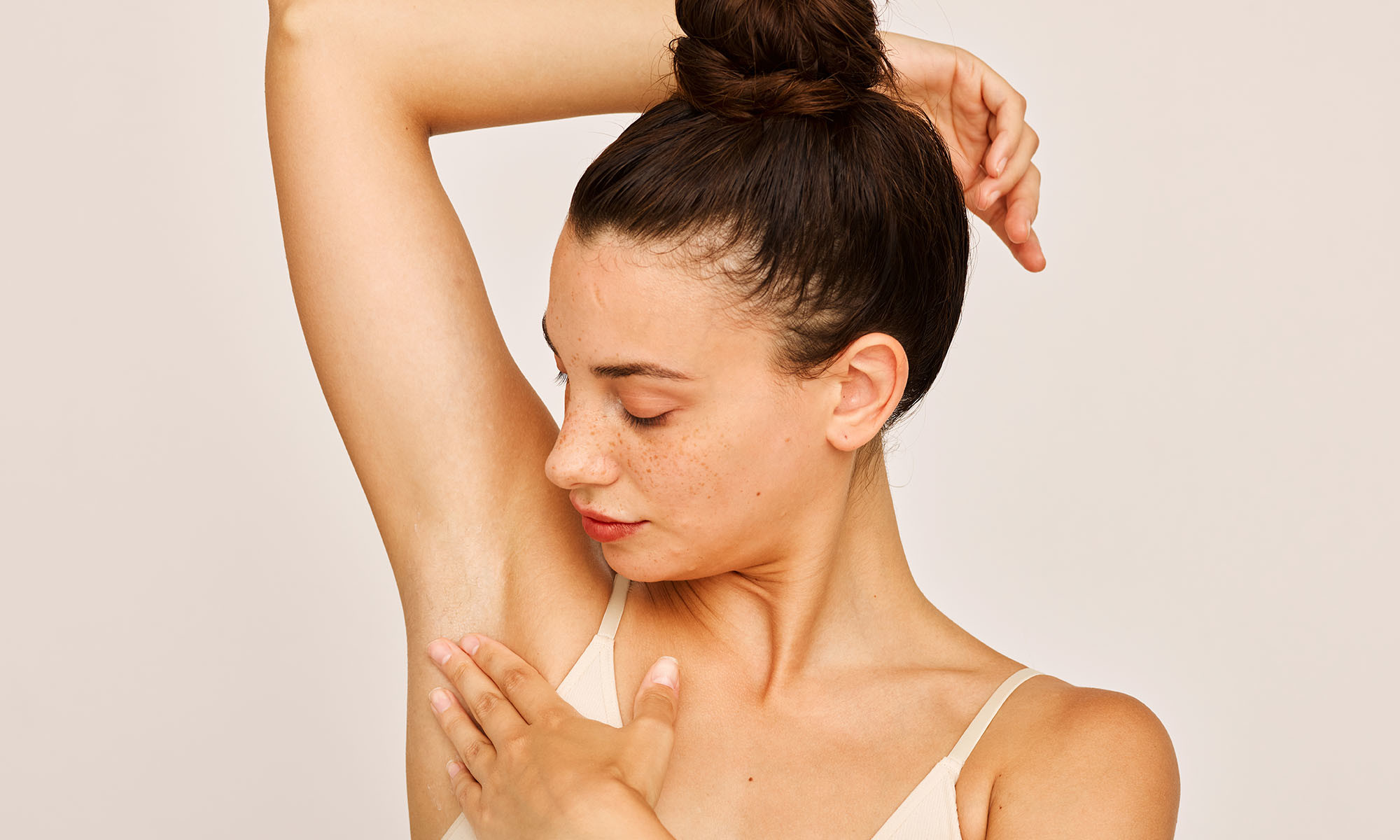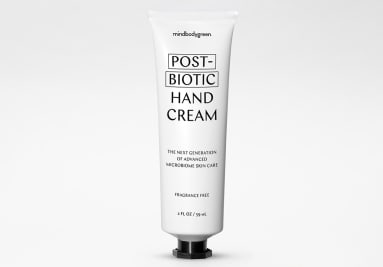So "Stress Sweat" Is A Thing – But Here's How To Stop The Stench
Why does it smell so much worse?

Image by Ohlamour Studio / Stocksy March 10, 2023 Our editors have independently chosen the products listed on this page. If you purchase something mentioned in this article, we may Let’s compare how you smell after an intense workout to minutes before a big, public presentation. In the former sweaty scenario, you actually might not smell that pungent—a little rank, maybe, but it likely doesn’t sting your senses too much. The latter situation, though, produces a very noticeable stench, despite only the slight prickle in your armpits. Yep, “stress sweat” is a thing, folks, and if you think it smells worse than a stuffy subway car on a hot, summer day, you’re certainly not alone. Below, we’ll walk you though the science behind stress sweat and what you can do about it, stat. 
Advertisement
This ad is displayed using third party content and we do not control its accessibility features.
What is stress sweat & why does it happen?
Eccrine glands.
First, you have the eccrine glands: These are your main sweat glands, and they cover almost all of the skin on your body but are most concentrated on your palms and soles.
“They are important for preventing your body from overheating; when hot, the salty water covers your skin and evaporates to cool your body,” says Bailey. “Secretion of your eccrine glands is primarily due to heat signals.” So when you sweat during a workout or on a scorching summer day, those are your eccrine glands at work. “Your eccrine sweat glands begin working when you are about two or three years of age,” Bailey adds.
Now, they can activate when you’re stressed—for example, when your palms grow sweaty when you’re nervous—but it’s not really considered “stress sweat.” After all, it’s not like your clammy hands give off a putrid odor.
Advertisement
This ad is displayed using third party content and we do not control its accessibility features.
Apocrine glands.
Then you have your apocrine glands, which are your body odor glands2 (aka, what causes stress sweat). “Apocrine glands are located in your armpits, breast, face, scalp, and groin, and they open into hair follicles instead of directly onto the skin,” Bailey explains. They don’t start secreting until puberty, but when they do, they release a thicker, oilier material that emits “chemosignals3” when stimulated by adrenaline.
“Apocrine glands are our version of scent glands. Skin bacteria break the secretion down enzymatically to create body odor, especially in the armpits,” Bailey adds. “The greater the fear, the greater the fear sweat, meaning that there is a dose response relationship between fear intensity and fear sweat intensity.2”
Apoeccrine glands.
Finally, you have the apoeccrine glands, which are relatively newly discovered (in 1987, researchers could not classify it as either eccrine or apocrine as it showed the characteristics of both glands; so they created an entirely new category4).
“It produces a salt water secretion that empties into hair follicles of the armpit,” says Bailey. “It develops at about eight to 14 years of age and represents as much as 45% of the sweat glands in the armpits.” While multiple scientists have noted that this type of glands exist, we need more research to fully understand their development. “Their role in fear sweat is unstudied,” notes Bailey.
Advertisement
This ad is displayed using third party content and we do not control its accessibility features.
Why does it smell different?
So sweat stress largely comes from your apocrine glands—but why are those glands the ones that produce scent? Well, it’s all evolutionary: “Adrenaline stimulates apocrine glands to secrete their complex and thick secretions,” says Bailey, which then drench your armpits in “chemosignaling information that’s hard to mask.” Meaning, other humans can perceive your fear or stress sweat, and this signals to them that there may be a threat ahead.
In fact, research shows other people can become fearful themselves5 after smelling your fear sweat—so in a way, you’re sending signals to protect others around you from danger. Obviously, public speaking jitters or anxious social situations aren’t really a threat to other folks, but our bodies are essentially communicating with each other in a transparent (albeit smelly) way.
What’s more, “Studies have shown that fear sweat is not easy to mask with fragrance6,” says Bailey, which is understandably frustrating when you’re trying to find a deodorant that, uh, works. “Other indicators of stress, such as facial expression, can be manipulated and controlled, but fear sweat can’t,” she adds. That, too, might be evolutionary, as you’re able to tell when another person is lying about a certain risk.
What to do about it.
Stress sweat's evolutionary purpose sounds neat and all, but unless you’re sprinting away from a saber-toothed tiger, you probably want to find ways to mitigate the stench. We hear you.
Advertisement
This ad is displayed using third party content and we do not control its accessibility features.
1.
Understand why B.O. happens.
First thing's first: Know that it’s not the sweat itself that actually causes B.O. “Body odor is produced when skin bacteria break down apocrine secretions,” says Bailey. In your pits, it's the bacteria Staphylococcus 7and Corynebacterium7 that release the pungent smell. “These bacteria increase in number when the skin pH increases from the normal skin pH of around 5.5. With increasing pH, there is increase in body odor,” Bailey adds.
Why is this info important? Well, when you understand the actual reasons behind B.O., you’ll be more equipped to stop it in the first place—rather than using deodorants that wreak havoc on your delicate microbiome.
2.
Choose a gentle yet effective deo.
Your product of choice may ultimately depend on your personal sensitivities and scent preferences, but Bailey generally recommends maintaining the normal acid skin pH in the armpit area—acid-based solutions, like Nécessaire’s Deodorant Gel, are popular options for this, but they do have the potential to irritate sensitive skin.
Starches and powders, like arrowroot or rice starch, are more sensitive-skin-safe ways to absorb moisture; botanical extracts, like garcinia mangostana peel extract and magnolia bark extract, also have strong antimicrobial and antioxidant properties, which can be beneficial at balancing the microbiome in favor of good bacteria. You can find a list of our favorite natural deodorants here.
Advertisement
This ad is displayed using third party content and we do not control its accessibility features.
3.
Reduce stress as best you can.
You may also want to find ways to manage your stress, which will undoubtedly reduce your stress sweat. It’s easier said than done, of course, but experts do have their tips and tricks to reduce in-the-moment panic before a big event or outing (think breathwork hacks, grounding techniques, and the like).
The takeaway.
Stress sweat is very different from sweat produced from heat or activity—those glands respond to adrenaline then secrete a substance that signals a threat. Instead of wrecking your skin microbiome with harsh deodorants and antiperspirants, it’s important to treat the armpit area (and your mental health) with the utmost care; then the stress sweat may become far less noticeable.

 Koichiko
Koichiko 

































